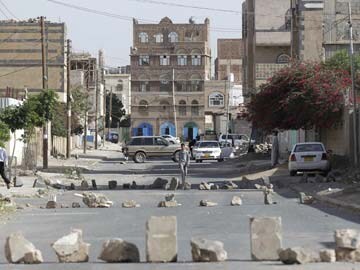
Sanaa:
Fierce clashes erupted between rebels and tribes backed by an army unit in a northern Yemeni city close to the capital yesterday, breaching a week-old ceasefire, a Defence Ministry official said, as the country's leaders said assailants were plotting to destabilise the country.
The official said that heavy weapons and artillery were being used in the fighting in the northern city of Arman.
Hawthi rebels, who belong to a branch of Shiite Islam, are fighting tribesmen from Yemen's largest tribal confederation, the Hashid, which is backed by an army unit and allied with the Muslim Brotherhood. Hawthis are backed by supporters from smaller tribes.
The official spoke on condition of anonymity. Mohammed Abdel-Salam, the rebels' spokesman, accused the Muslim Brotherhood's Islah party in parliament of instigating the breach in the ceasefire.
The number of casualties was not immediately clear but over the past months hundreds have been killed and injured in similar clashes that have spilled to northern cities where rebels accuse ultraconservative Salafis of trying to spread their ideology in Shiite strongholds.
The Hawthis waged a six-year insurgency in the north against ousted President Ali Abdullah Saleh, which officially ended in 2010.
Meanwhile, Yemeni officials accused Saleh and his loyalists of trying to stage a "coup" and roll back the country's transition from his rule.
In a statement carried by Yemen's official news agency Saba, President Abed Rabbo Mansour Hadi said that the country faced a "plot to abort the transitional political process" on June 11, when security forces say assailants set fire to tires across the capital some 280 times and besieged dozens of trucks carrying fuel, causing a shortage. Assailants also struck power stations and grids, they added.
Electricty went out across Yemen that day and lines of cars waiting for fuel stretched outside gas stations, amid reports of scattered demonstrations by armed men.
"This is aimed at bringing the wheel of history backward and taking us to square 1," Hadi said, without giving the names of those behind the alleged plot.
The official said that heavy weapons and artillery were being used in the fighting in the northern city of Arman.
Hawthi rebels, who belong to a branch of Shiite Islam, are fighting tribesmen from Yemen's largest tribal confederation, the Hashid, which is backed by an army unit and allied with the Muslim Brotherhood. Hawthis are backed by supporters from smaller tribes.
The official spoke on condition of anonymity. Mohammed Abdel-Salam, the rebels' spokesman, accused the Muslim Brotherhood's Islah party in parliament of instigating the breach in the ceasefire.
The number of casualties was not immediately clear but over the past months hundreds have been killed and injured in similar clashes that have spilled to northern cities where rebels accuse ultraconservative Salafis of trying to spread their ideology in Shiite strongholds.
The Hawthis waged a six-year insurgency in the north against ousted President Ali Abdullah Saleh, which officially ended in 2010.
Meanwhile, Yemeni officials accused Saleh and his loyalists of trying to stage a "coup" and roll back the country's transition from his rule.
In a statement carried by Yemen's official news agency Saba, President Abed Rabbo Mansour Hadi said that the country faced a "plot to abort the transitional political process" on June 11, when security forces say assailants set fire to tires across the capital some 280 times and besieged dozens of trucks carrying fuel, causing a shortage. Assailants also struck power stations and grids, they added.
Electricty went out across Yemen that day and lines of cars waiting for fuel stretched outside gas stations, amid reports of scattered demonstrations by armed men.
"This is aimed at bringing the wheel of history backward and taking us to square 1," Hadi said, without giving the names of those behind the alleged plot.
Track Latest News Live on NDTV.com and get news updates from India and around the world

